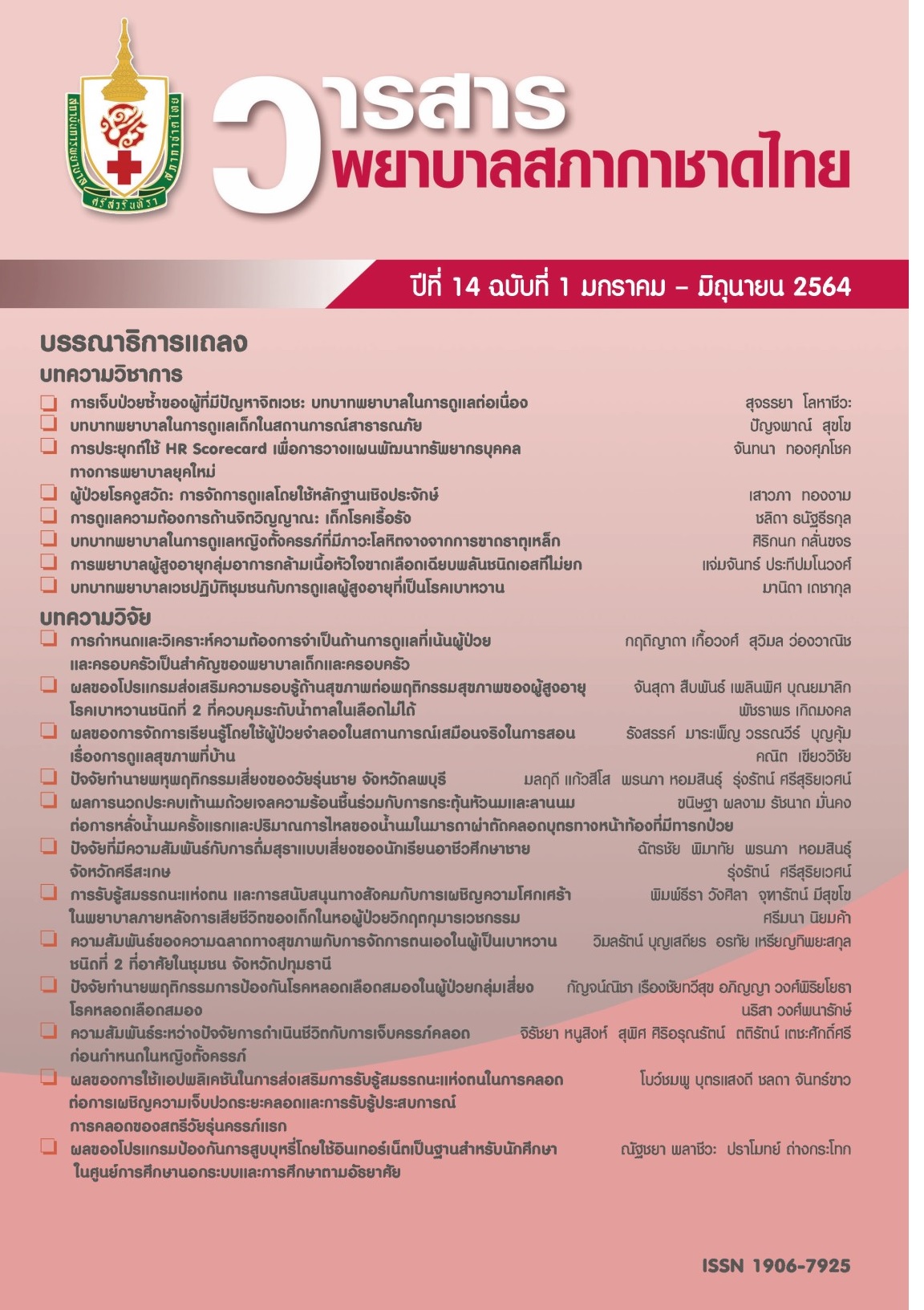The Association of Health Literacy with Self-Management in People with Type 2 Diabetes Living in Communities, Pathum Thani Province
Keywords:
health literacy, self-management, type 2 diabetesAbstract
A correlational research study was conducted aiming to investigate the relationships among health literacy, demographic characteristics, and self-management of people with type 2 diabetes living in communities in Pathum Thani province, Thailand. The 303 participants were randomly selected using a multistage sampling method using the following inclusion criteria: (i) had been diagnosed with type 2 diabetes for at least one year (ii) consistently taking oral anti-diabetic agent(s), and (iii) were Thai citizens who spoke Thai language and were willing to be interviewed. The instruments consisted of the interview forms on demographic characteristics, Health Literacy, and the Diabetes Self-Management. Data were analyzed using descriptive statistics. Mann Whitney U test, Kruskal Wallis, and Spearman Rank Correlation Coefficient were used to investigate the associations among health literacy and other variables. The results showed that demographic characteristics such as educational level, marital status, family income, and duration of having diabetes were significantly associated with health literacy sum scale (p<0.05). Sum scale of health literacy and self-management were found to be significantly associated (p<0.001). All levels of health literacy were related to healthcare use subscale (p<0.01), and communicative health literacy was significantly related to sum scale and all subscales of self-management (p<0.05).
These research findings may assist nurses to design health teaching plans concerning self-care management that are appropriate to the level of patient’s health literacy. Additionally, the study of diabetes populations in other communities and study of predictive factors of health literacy and self-management of people with diabetes may widen such knowledge and lead to practice enhancements.
References
2. Vichakorn W. Provincial inspection commission report 2018 [Internet]. 2018 [cited 2019 May 22]. Available from: http://bie.moph.go.th/e-insreport/file_report/2018-08-06-08-21-46-11.pdf (in Thai)
3. Boonsatean W, Reantippayasakul O. Health literacy: situation and implacts on health status of the older adults. APHEIT Journal of Nursing and Health 2020;2(1):1-19. (in Thai)
4. Berkman ND, Davis TC, McCormack L. Health literacy: what is it?. J Health Commun 2010;15(Suppl 2):9-19.
5. Nutbeam D. Health literacy as a public health goal: a challenge for contemporary health education and communication strategies into the 21st century. Health Promot Int 2000;15(3):259–67.
6. Çaylan A, Yayla K, Öztora S, Dagdeviren HN. Assessing health literacy, the factors affecting it and their relation to some health behaviors among adults. Biomed Res 2017;28(15):6803-7.
7. Bodur AS, Filiz E, Kalkan I. Factors affecting health literacy in adults: a community based study in Konya, Turkey. Int J Caring Sci 2017;10(1):100–9.
8. Wu Y, Wang L, Cai Z, Bao L, Ai P, Ai Z. Prevalence and risk factors of low health literacy: a community-based study in Shanghai, China. Int J Environ Res Public Health 2017;14(6):E628.
9. Ginggeaw S, Prasertsri N. The relationship between health literacy and health behaviors among older adults who have multi-morbidity. NJPH 2015;25(3):43-54.
10. AbbasZadeh Bazzi M, Karimiaval M. Relationship between health literacy and self-care behaviors in diabetic patients type II referred to the center of diabetes control and prevention in zabol. Journal of Health Literacy 2018;3(1):10-9.
11. Sayah FA, Majumdar SR, Williams B, Robertson S, Johnson JA. Health literacy and health outcomes in diabetes: a systematic review. J Gen Intern Med 2012;28(3):444-52.
12. Souza JG, Apolinario D, Magaldi RM, Busse AL, Campora F, Jacob-Filho W. Functional health literacy and glycaemic control in older adults with type 2 diabetes: a cross-sectional study. BMJ Open 2014;4(2):e004180. doi: 10.1136/bmjopen-2013-004180
13. Boonsatean W. Living with type 2 diabetes in a Thai population: experiences and socioeconomic characteristics [dissertation]. Sweden: Malmö: Malmö University; 2016.
14. Rachmawati U, Sahar J, Wati DNK. The association of diabetes literacy with self-management among older people with type 2 diabetes mellitus: a cross-sectional study. BMC Nurs 2019;18(Suppl 1):34. doi: 10.1186/s12912-019-0354-y
15. Osborn CY, Bains SS, Egede LE. Health literacy, diabetes self-care, and glycemic control in adults with type 2 diabetes. Diabetes Technol Ther 2010;12(11):913-9.
16. Wang RH, Hsu HC, Lee YJ, Shin SJ, Lin KD, An LW. Patient empowerment interacts with health literacy to associate with subsequent self-management behaviors in patients with type 2 diabetes: a prospective study in Taiwan. Patient Educ Couns 2016;99(10):1626-31.
17. Bohanny W, Wu SF, Liu CY, Yeh SH, Tsay SL, Wang TJ. Health literacy, self-efficacy, and self-care behaviors in patients with type 2 diabetes mellitus. J Am Assoc Nurse Pract 2013;25(9):495-502.
18. AHRO. Health literacy interventions and outcomes: an updated systematic review [Internet]. 2011 [cited 2018 Feb 16]. Available from: https://archive.ahrq.gov/research/findings/evidence-based-reports/litupsum.pdf
19. Suka M, Odajima T, Kasai M, Igarashi A, Ishikawa H, Kusama M, et al. The 14-item health literacy scale for Japanese adults (HLS-14). Environ Health Prev Med 2013;18(5):407-15.
20. Inoue M, Takahashi M, Kai I. Impact of communicative and critical health literacy on understanding of diabetes care and self-efficacy in diabetes management: a cross-sectional study of primary care in Japan. BMC Fam Pract. 2013;14:40. doi: 10.1186/1471-2296-14-40.
Downloads
Published
Issue
Section
License
เนื้อหาบทความหรือข้อคิดเห็นต่างๆ ในวารสารพยาบาลสภากาชาดไทยนี้ เป็นความคิดเห็นของผู้เขียนบทความ ไม่ใช่ความเห็นของกองบรรณาธิการ หรือสถาบันการพยาบาลศรีสวรินทิรา สภากาชาดไทย






